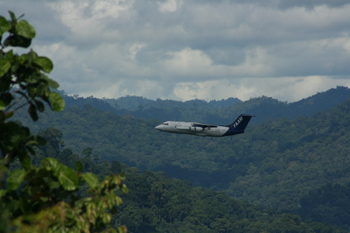Boost to UK/Malaysian research to measure forests impact on climate change

Lancaster University is leading a £2.5 million scientific UK/Malaysian research project on the biosphere and its interactions with the atmosphere and the Earth's climate.
The Natural Environment Research Council (NERC) Consortium is funding the project is based in Danum Valley, one of the largest and most important protected areas of pristine lowland rainforests in Southeast Asia and home to the joint Malaysia - UK Sekhar Foundation & Royal Society's South East Asian Rainforest Research Programme (SEARRP).
The three year project ( Oxidant and particle photochemical processes above a South-East Asian tropical rain forest (OP3-Danum-08) is led by Professor Nick Hewitt of Lancaster University and aims to achieve a better understanding of how forests control the composition and chemistry of the atmosphere, what their impact is on climate and how any changes to the forest will influence the Earth's climate. Research will be carried out by more than 60 scientists from the UK, Malaysia, USA and other European countries.
Professor Nick Hewitt explained: "Tropical forests take up gases from the atmosphere (eg carbon dioxide) but also give out huge amounts of other reactive chemicals - the ones you can smell when you walk through a pine forest, or when you crush aromatic leaves in your fingers, for example.
"By doing this, forests greatly influence the chemical composition of the atmosphere, and this in turn affects climate. Our project aims to understand how forests control the composition and chemistry of the atmosphere, what their impact is on climate and how this might change in the future."
The major phase of the research project was launched on Saturday 12 July in Malaysia, witnessed by Datuk Dr Maximus Ongkili, Malaysian Minister of Science, Technology and Innovation, Datuk Douglas Uggah Embas, Malaysian Minister of Natural Resources and Environment and HE Boyd McCleary, British High Commissioner to Malaysia.
The Ministers and High Commissioner were also taken on board the specially fitted atmospheric science research aircraft that will perform 50 hours of scientific mission flying over Sabah for this phase of the project.
The project involves the Universities of Lancaster, Leeds, Leicester, East Anglia, Manchester, York Cambridge and Edinburgh, together with the UK's Centre for Ecology and Hydrology.
The ground-based measurements are made at the Bukit Atur Global Atmospheric Watch station in Danum Valley, operated by the Malaysian Meteorological Department. The airborne observations are provided by the UK's Facility for Airborne Atmospheric Measurements (FAAM) BAe-146 aircraft. This state-of-the-art atmospheric research aircraft is owned by BAe Systems and is contracted by NERC and the UK Met Office to support their weather and climate research programmes.
For further information http://www.es.lancs.ac.uk/op3/